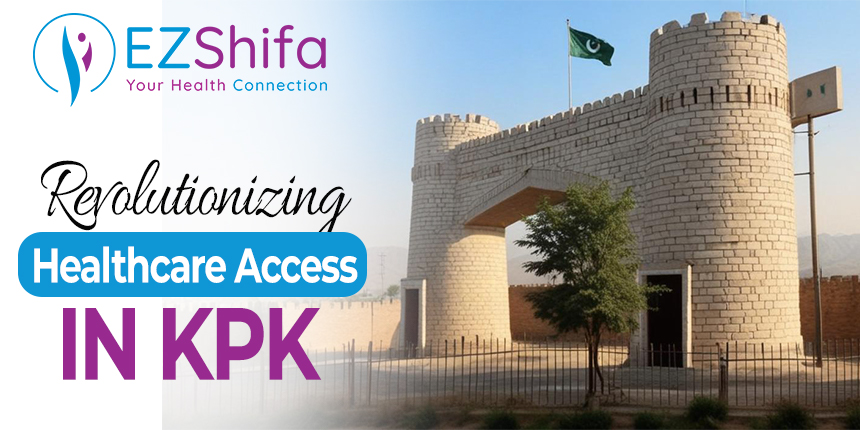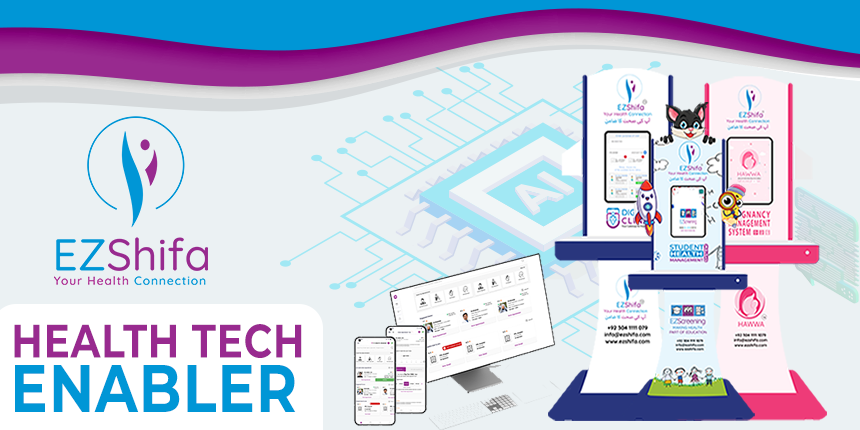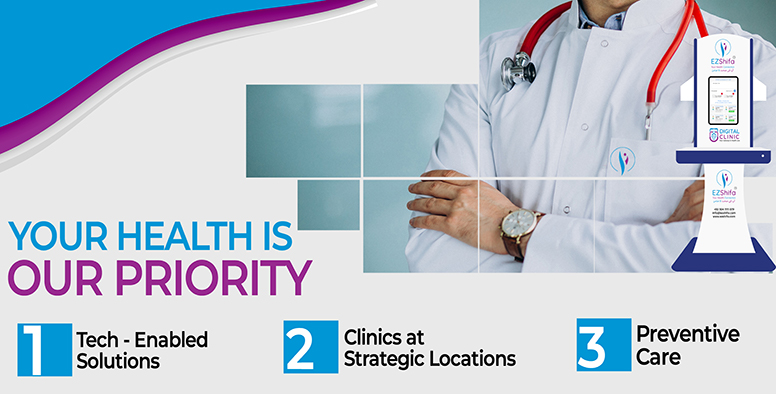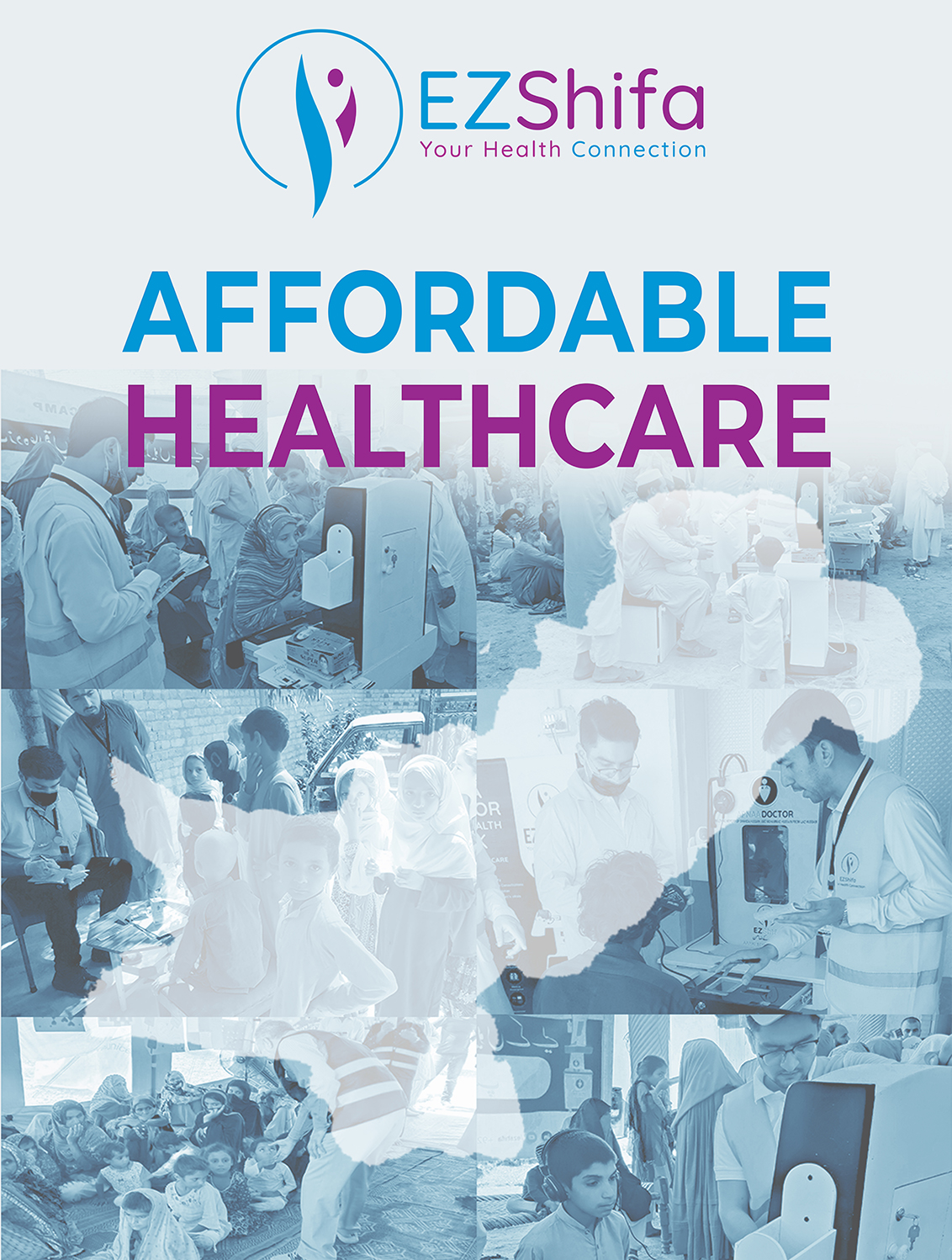EZShifa Health System: Transforming Healthcare for the General Population of KPK
Pakistan currently ranks 154th out of 195 countries regarding overall health system performance. Regarding access to and utilization of health services, significant disparities exist between urban and rural areas and between people from different income groups. The Pakistan Digital Census, 2023, has put the population of Khyber Pakhtunkhwa at 40.8 million, recording an increase of 5.3 million at a growth rate of 2.3 per cent since 2017.

Problem Statement
With its diverse population and unique geographical problems, Khyber Pakhtunkhwa (KPK) province needs help with its health facilities. Moreover, according to the 2023 Census, the population has increased to 40.85 million, which is a big chunk of Pakistan's total population. Therefore, in roughly two generations, the province's population has increased by 36 million, which is almost eight times the increase.
Khyber Pakhtunkhwa's rapid population growth is primarily due to a high Total Fertility Rate (TFR). Factors contributing to this slow decline include low contraception adoption, low educational attainment, demand for large families, inadequate attention to birth spacing, and social and cultural pressures. In addition, the region has a mix of urban and rural towns, and many people live in hard-to-reach places. This wide range of demographics makes it harder to ensure everyone has equal access to health care.
Existing Healthcare Infrastructure in KPK
Compared to other parts of Pakistan, KPK has a better healthcare system. However, the state needs help meeting the medical needs of its people because it only has a few hospitals and clinics. According to current reports, more than 1,500 hospitals, clinics, and primary health units are needed to care for the growing population. According to the data, the number of sanctioned beds in 2020 was 1 bed per 2,000 population.
Health Indicators in KPK
- Neonatal mortality rate: 41 per 1,000 live births
- Infant mortality rate: 53 per 1,000 live births
- Under-five mortality rate: 64 per 1,000 live births
- Maternal mortality ratio: 175 per 100,000 live births
- Merged district's maternal mortality ratio: 261 per 100,000 live births

Problems in the Health Sector of KPK
KPK's health woes are made worse by several significant issues:
Fragmented System
KPK's healthcare system is broken up, which makes it less efficient and leaves breaks in service delivery. Patients often need help figuring out how to use the complicated System, which causes them to miss or be late for treatments.
Low Literacy Rate
The province's low literacy rate makes it harder to provide health care. Low literacy rates in KPK lead to limited employment opportunities, decreased purchasing power, and limited access to resources, affecting healthcare access and quality. Nutritional deficiencies and ignorance are exacerbated. Addressing these challenges requires improving education, creating economic opportunities, enhancing health education, expanding healthcare access, and engaging communities in health initiatives.
Serious Accessibility Problems
The rugged landscape and scattered settlements in KPK create severe accessibility issues. Many communities are isolated and have limited access to healthcare facilities, especially during emergencies.
Non-Sustainable Processes
Existing healthcare processes often need to be revised. Facilities are overburdened, resources are scarce, systems need more, and management needs to be improved.
Other Problems
The healthcare challenges in KPK are multifaceted, with inflation, uncontrolled healthcare costs, and limited financial resources exacerbating the situation. Combined with poor healthcare infrastructure, a shortage of medical professionals, and gaps in health insurance, these issues create significant barriers to accessing quality healthcare. Addressing these problems requires comprehensive strategies that include economic stabilization, healthcare regulation, and improved health education to ensure that all individuals in KPK can attain better health outcomes.
The Solution: EZShifa Telehealth System
EZShifa Health System offers a complete and comprehensive solution to KPK's healthcare challenges. By leveraging advanced technology and innovative practices, EZShifa aims to transform healthcare delivery in the province.
1. Non-Invasive and Invasive Diagnostics
The System has both non-invasive and invasive diagnostic tools, which allow different health problems to be diagnosed correctly and quickly. This thorough method of diagnosis ensures that patients get the right care quickly.
2. Contagious Diseases Management
EZShifa has the right tools to manage contagious illnesses well. Protocols are built into the System to quickly find, isolate, and treat infectious diseases, which helps keep cases under control.
3. Rapid Testing
EZShifa's rapid testing features ensure that conditions are diagnosed quickly, cutting down on wait times and improving patient results. This is especially important in situations involving long-term illnesses.
4. Doctor Consultations:
EZShifafacilitates seamless doctor consultations, both in person and via telemedicine. It ensures that even those in remote areas can access medical advice and follow-up care without needing to travel long distances.
5. Health Screening
Regular health tests are critical to preventive care. EZShifa offers comprehensive health screenings to find possible health problems before they get worse.
6. Electronic Medical Records (EMR):
EZShifa has a robust EMR system that ensures all patient records are digitalized and easily found. This combination makes it easier to coordinate care and reduces fragmentation.
EZShifa Minimizing Cost of Healthcare
Telehealth is internationally approved and incorporates real-time patient-clinician communication. Everyone knows that telehealth saves money and enhances health-critical healthcare access. Increasing telehealth units boosts performance. By eliminating health system-funded travel and expensive specialized follow-up, costs have dropped. Telementoring, reduced secondary care, and alternative payment increased productivity.
Cut Travel Costs
EZShifa dramatically lowers travel costs to get medical care through its complete telemedicine platform. Patients in Khyber Pakhtunkhwa's remote and underserved areas can meet with qualified medical professionals through virtual consultations instead of making long, expensive trips to medical centres in cities. Not only does this save money on travel costs, but it also saves patients time and effort when they get medical advice, follow-ups, and regular check-ups. Using technology, EZShifa ensures everyone can get good healthcare, no matter where they live.
Lower Chronic Disease Costs
In-time diagnosis at EZShifa Digital Clinic lowers chronic disease expenditures. Early detection and treatment of primary disorders minimizes chronic disease risk and costs. Most Pakistanis self-medicate for BP, glucose, heartbeat, temperature, etc., due to cost and accessibility, which is unhealthy.
Reduction in The Cost of Large Healthcare Infrastructure
EZShifa Digital Clinic reduces healthcare infrastructure costs. A kiosk can provide better primary care than expensive infrastructure. Hospitals need expensive equipment, furnishings, fixtures, and technical support. They must be governed by doctors and consultants. Integrating telehealth solutions within the existing healthcare infrastructure can solve the problem. Further, connecting these solutions to pharmacies, emergency clinics, large hospitals, and ambulances can save huge costs.
Public Sector Administrative Cost Reduction
EZShifa Digital Clinic quickly alters patient treatment. Clinical and administrative processes are simplified. With many kiosks, public sector administrative costs will decrease. Affordable, high-quality health care is accessible at EZShifa Digital Clinic. Consistent remote patient monitoring. Early treatment reduces the chance of major consequences. This facility will discourage patients, lowering public hospital costs.
Conclusion
For the general people in KPK, the EZShifa Health System is a big step forward in dealing with their health problems. By offering a complete and unified method of healthcare delivery, EZShifa is ready to help the area solve its long-standing problems. EZShifa will change the health care system in KPK by making it easier for people to get to, making processes more efficient, and using cutting-edge technology. It will lead to better health results for everyone.
EZShifa Copyright ©








Leave a Reply
Leave a message if you like. Required fields are marked. *